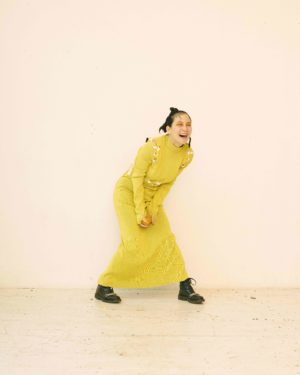Michelle Zauner—a.k.a Japanese Breakfast—is a songwriter, author, director, and composer born in Seoul, Korea and raised in Eugene, Oregon. For Zauner, 2021 was a next-level year thanks to her best-selling memoir Crying in H Mart and her GRAMMY-nominated and critically acclaimed album Jubilee, launching her from small-time indie fame to pop stardom. And she’s not done yet—her memoir was recently greenlit for the silver screen, and she’s currently adapting it into a screenplay.
Although Zauner’s success seems sudden, in actuality it’s been years in the making. After leaving the Philly-based pop-punk band Little Big League for a return to Oregon to spend time with her terminally ill mother in 2014, Zauner was at a major crossroads. Thankfully for her fans, she began to noodle with solo material, planting the seedling of what would eventually become Japanese Breakfast. Music, however, wasn’t enough. In 2016, the same year she released her debut album Psychopomp, Zauner won a Glamour Magazine essay contest with her entry Love, Loss, and Kimchi, a piece about the death of her mother. Her Glamour essay would go on to influence her highly acclaimed 2018 New Yorker piece Crying in H Mart, an ode to the Korean grocery store chain where she would shop with her mother and a place that kept her connected to her Korean roots.
That New Yorker piece would find new life as her memoir that delved deeper into Zauner’s complicated relationship with her mother. Oddly enough, the transformation from essay to movie parallels the process of fermentation in a way, which is a recurring theme in H Mart and Jubilee. On the track “Posing for Cars,” it’s used as a metaphor for the way Zauner loves—a love that “needs to marinate” and grow with time. In the chapter titled “Kimchi Fridge” from her memoir, however, she uses fermentation a bit differently. “It exists in time and transforms,” she writes. “So it is not quite controlled death, because it enjoys a new life altogether.” And, indeed, Zauner acknowledges that Jubilee and Crying in H Mart are very much in conversation with each other. Yet the album (which was released after the book) is much more lighthearted than her memoir barring a few dark moments like the track “Savage Boy,” a brilliant character piece about an oblivious patriarchal villain which is sung in the first person. It’ll be interesting to see how time and distance from her memoir will affect her screenplay.
“I think so much of what you learn in writing a book or in your creative writing courses is to let the story unfold. Outlining is a distraction from the actual writing process, so it’s been an interesting adjustment for me.”
“I haven’t started working on the screenplay yet, so I can’t really say how it’s changed,” Zauner tells me of the possible differences between her book and the screenplay. “One major difference, I think, is that there’s a real focus on outlining that the [film] producers have really pushed for. And I think so much of what you learn in writing a book or in your creative writing courses is to let the story unfold. Outlining is a distraction from the actual writing process, so it’s been an interesting adjustment for me. I’m at that place where I’ll revisit the outline a bit more, but I’d like to start writing pretty soon.”
While there was some speculation that Zauner would be composing music for the film, she wants to make it clear that she’s only supervising which songs will be used. And she already has a few groups in mind, including the K-pop group Fin.K.L and the Korean folk-psych artist Kim Jung Mi, a singer her aunt and mother listened to when they were very young. Other possible needle drops include an acoustic version of “Everlong” by the Foo Fighters, “Maps” by Yeah Yeah Yeahs, and “Chelsea Hotel #2” by Leonard Cohen, songs that inspired her memoir and which Zauner included in a Spotify playlist tied to the book.

Because this medium is so different from anything she’s done before, it’s difficult to predict how her memoir will translate to film. But her recent success shows that she’s more than capable of creating something special regardless of the medium, and she has the additional help of producers who are guiding her through all the idiosyncrasies of writing her first screenplay. Her challenge now is figuring out how to hit specific movie beats that will keep the studio happy while still staying true to the feel of her memoir.
“If I do my job and hopefully am able to provide a multi-faceted character through dialogue, and we find a director and an actress who is able to bring that out, I think that’s always the goal for any character.”
“I think it’s kind of similar to having an editor in the book writing process,” says Zauner of her producers. “I think they’re a little bit more involved before the writing even begins. Because of the craft of drama, there need to be very clear outlines and beats. And also you need the approval of the studio and the feeling that the producers are on the same page. There are more cooks in the kitchen.”
In a recent GRAMMY Museum interview about her memoir, Zauner spoke about her fear of inadvertently molding her mother into a stereotype when writing the book. Indeed, writing a complex character is always a challenge, especially one that hits so close to home. “I think that’s something I feel toward any character,” explains Zauner. “If I do my job and hopefully am able to provide a multi-faceted character through dialogue, and we find a director and an actress who is able to bring that out, I think that’s always the goal for any character.”
Zauner’s mother, for obvious reasons, weighs heavily on Michelle’s work, from Psychopomp to Jubilee—and, of course, her memoir. However, certain moments in Jubilee hint at what lies beyond Zauner’s grief. From the aforementioned “Savage Boy” to “Kokomo, IN,” these songs are creative pieces where Zauner is at the height of her songwriting powers, sculpting characters that go beyond her and take her songs to a new space, which is a rare talent to have. Not to mention perfect for the big screen. FL









